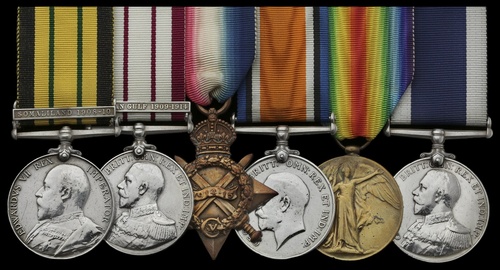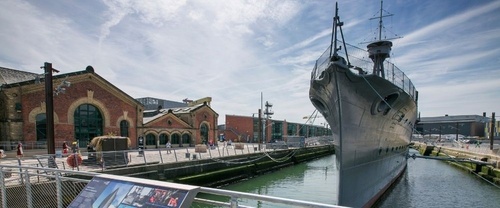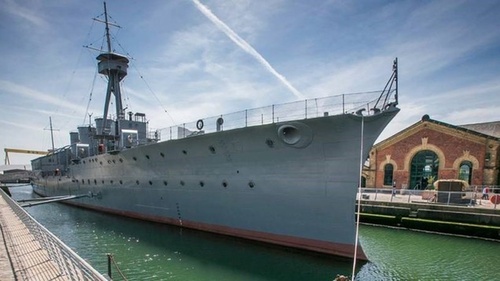Auction: 22003 - Orders, Decorations and Medals
Lot: 367
' "Carry on smoking" was piped, and we were in the position of being spectators of the fight now raging with intensity around us. Some difficulty had been experienced in keeping our men, who were engaged in ammunition supply and other multifarious tasks below, at their stations. They had now been some hours standing by and doing nothing and naturally wanted to see the scrap. When the word was passed to "Carry on smoking", they scrambled up on deck keeping handy to hatchways and ready to jump down to their stations should the need arise. It was a glorious sight to see our big ships firing their broadsides. On two occasions, when their shells had found their billets on an enemy ship … our men, who also clapped as if witnessing a football match, gave loud cheers!'
The scene aboard the light cruiser H.M.S. Caroline in the opening stages of the battle of Jutland; she was later heavily straddled by enemy fire.
A Somaliland, Persian Gulf and Great War campaign group of six awarded to Leading Stoker G. P. Lansdowne, who was present in the light cruiser H.M.S. Caroline at the battle of Jutland
Today, one may follow in Lansdowne's footsteps, for Caroline is the sole surviving ship to have been engaged at Jutland and is a floating museum open to the public at Belfast
Africa General Service 1902-56, 1 clasp, Somaliland 1908-10 (SS. 104996 G. P. Lansdowne, Sto. 1 Cl., H.M.S. Philomel); Naval General Service 1915-62, 1 clasp, Persian Gulf 1909-1914 (SS. 104996 G. P. Lansdowne, Sto. 1Cl., H.M.S. Philomel.); 1914-15 Star (K. 13414 G. P. Lansdowne, Sto. 1, R.N.); British War and Victory Medals (K. 13414 G. P. Lansdowne, L. Sto., R.N.); Royal Navy L.S. & G.C., G.V.R., 2nd issue, fixed suspension (K. 13414 G. P. Lansdowne, Sto. 1, H.M.S. Dolphin.), polished, contact marks, nearly very fine (6)
George Phillip Lansdowne was born in Swindon, Wiltshire on 12 January 1888 and joined the Royal Navy as a Stoker 2nd Class in May 1907.
He subsequently witnessed active service in H.M.S. Philomel off Somaliland (Medal & clasp) and in the Persian Gulf (Medal & clasp), in which period he was advanced to Stoker 1st Class in July 1908 and re-engaged for service with the number K. 13414 in November 1911.
Jutland
In December 1914 he joined H.M.S. Caroline, a ship of the 4th Light Cruiser Squadron, and it was in the same capacity that he was subsequently present at the battle of Jutland.
On that occasion, Caroline - under Captain H. R. Crooke, R.N. - escorted the Battle Cruiser Fleet. In the early stages of the battle, she and her consorts were positioned on the disengaged side, but after the Battle Fleet joined them, the squadron went into action.
At about 1700 hours, Caroline engaged German destroyers that were in the process of carrying out a torpedo attack, herself being narrowly missed.
At around 2045 hours, Captain Crooke observed a line of German battleships at a range of less than three miles and prepared to attack, but Admiral Jerram in the King George V refused him permission to proceed, believing the battleships to be British. He was wrong and a golden opportunity was lost.
Crooke was finally given permission to mount his attack, a brace of Caroline's torpedoes passing very close to the Nassau but without impact. Caroline and her consort Royalist then came under heavy fire, 11-inch shells straddling them both and causing casualties. One of Caroline's carpenters, Frederick Fielder, takes up the story:
'Our starboard torpedoes were trained on them, and as we fired two torpedoes, so the nearest ship to us opened fire with a broadside of eleven-inch guns, but we were lucky enough not to be struck, although it was a straddle, some shots falling short, others going over. By all the rules of gunnery, the next broadside should have finished our career, especially as we were at such close range. The enemy set up a large star shell to light us up, but our 'Guardian Angel' was still protecting us, for the next broadside missed us, going over. The shells screamed over our heads, some dropping between us and our own ships on the other side. By this time we had set up a smoke screen and escaped from an extremely perilous position, for the small ship would have been literally blown off the water had any of the broadsides fired at us got home. However, we did escape, due no doubt to the erratic German shooting, their men probably being in a state of panic or blue funk as they must have received fearful punishment from our hands.'
Subsequent career
Awarded his L.S. & G.C. Medal in 1924, Lansdowne was pensioned ashore as a Leading Stoker in January 1931, when he enrolled in the Royal Fleet Reserve.
Recalled on the renewal of hostilities, with an appointment at the Devonport base Drake, he subsequently removed to the Clyde establishment Spartiate and was released to the Reserve List in February 1944.
Postscript
Today, it is possible to walk in Lansdowne's footsteps, for the cruiser Caroline is berthed at Belfast, the only surviving ship of the battle of Jutland. The website of the National Museum of the Royal Navy, states:
'A finalist of the Art Fund's Museum of the Year 2019 awards, H.M.S. Caroline is Belfast's newest five-star rated visitor attraction. Shortly after the First World War, H.M.S. Caroline arrived in Belfast - her home for almost one hundred years. Step on board and experience life at sea.
Walk through the original, authentic historic spaces and discover the Captain's cabins or take a seat in the Ward Room and see how the officers dined. Discover the stories of people who served on board the ship through our state-of-the art interactive exhibits in the Virtual Access Suite or learn some of the skills sailors used in the Signal School. Then, descend into the rumbling engine rooms and listen as the ship is brought to life … '
The same 'rumbling engine rooms' in which Lansdowne worked as a Stoker at Jutland.
Subject to 20% VAT on Buyer’s Premium. For more information please view Terms and Conditions for Buyers.
Sold for
£700
Starting price
£350









